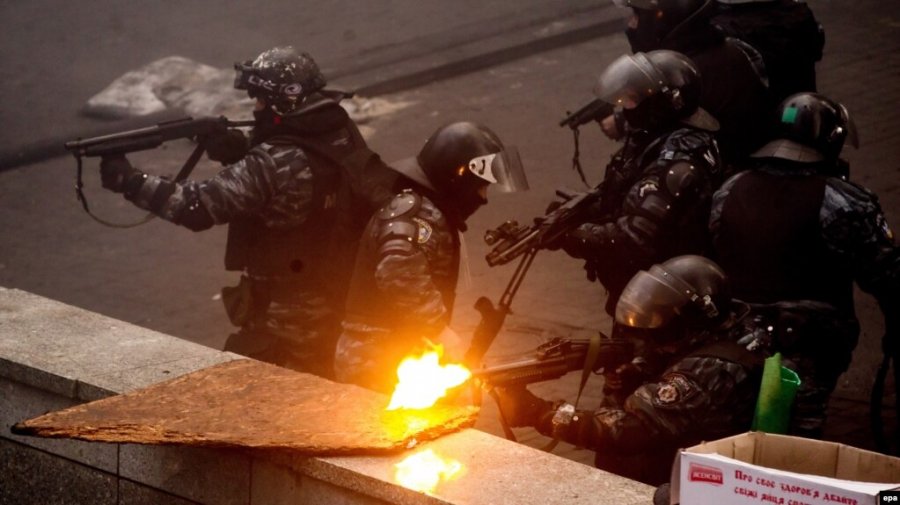Former Ukrainian special forces officer to go on trial over Maidan killings

A Kyiv court has been passed the indictment against former Omega special force officer Volodymyr Kosenko on charges of killing and attempting to kill Maidan activists on 20 February 2014, the bloodiest day of the Euromaidan protests. The trial should begin shortly, however there is a problem which, if not resolved, could result in the commencement of the trial dragging on for years.
Kosenko, then 33, was first charged over the killing of one Maidan activist and wounding of another in February 2020. The official report on 18 February stated that the person, who was not named, had been charged with murder and attempted murder (under Article 115 § 2 of Ukraine’s Criminal Code), as well as exceeding official powers (Article 365 § 3). Further charges have now been added under Article 258 § 3 of Ukraine’s Criminal Code (committing an act of terrorism); Article 365 § 3 (exceeding power and official authority) and Article 340 (obstructing peaceful assembly). The main charges alone could carry a sentence of up to life imprisonment.
Kosenko is accused of having deliberately aimed and shot at protesters on Instytutska St. in the morning of 20 February 2014. The Advocacy Advice Panel reports that the case itself is about 35 killings and 58 protesters wounded, since Kosenko is accused of coordinated actions with Berkut officers, and that all are accused of shooting, without trying to ascertain whether those whom they aimed at were unarmed.
Kosenko is specifically accused of having killed Oleh Ushnevych and wounded Vitaly Hukov, with the Fort 14 pistol used in both cases having been issued to Kosenko. The morning after the killings, representatives of the Human Rights Ombudsperson’s Secretariat found bullets on the snow barricade that were also fired from Kosenko’s pistol. Yevhenia Zakrevska, one of the lawyers for Maidan victims, earlier pointed out that from the snow barricade, Hukov would have been within firing range.
The forensic examination found that Oleh Ushneyvych had one bullet wound to the stomach from a 9 mm. calibre gun, shot from a short distance, as well as two wounds from a 7.62 calibre weapon shot when he was already lying down, and also from a short distance away. It appears to have been the stomach wound that was fatal.
The prosecution also presented an expert assessment which found that the bullets which hit Ushnevych and Hukov, as well as another bullet found by a witness, came from a pistol registered under Kosenko’s name. He had, on 9 February 2014, received a Kalashnikov and the Fort-14 pistol, both of which he returned two weeks later. There is also testimony from other former Omega officers confirming that they were deployed in the relevant part of Instytutska St.
Much of the above evidence was presented to a judge at the Pechersky District Court on 19 February 2020 hearing the prosecutor’s application for Kosenko to be remanded in custody. Given the number of Maidan suspects that have fled to Russia, the request seemed warranted, yet was rejected by judge Oleksiy Sokolov who instead ordered that he be placed under house arrest.
The same prosecutors have now passed the indictment to the same Pechersky District Court since this is what is demanded by Ukraine’s Criminal Procedure Code. The trouble is that, according to Oksana Mykhalevych, the lawyer representing the victims or victims’ families in this case, all the judges from this court have been involved in proceedings either involving Kosenko, or other proceedings linked to the same episode. This effectively disqualifies them from serving as judge in the trial. She says that there are two ways open. The case can get passed, like a hot potato, from one judge to another, with each in tune either recusing themselves, or being recused after one of the parties lodges the relevant application. This Mykhailevych warns could drag on for years.
The other option, which must be hoped for, is that the Pechersky District Court immediately asks for a change in the case’s jurisdiction on the grounds that a panel of judges cannot be formed to examine the case. This, in contrast to the first option, would not lead to a huge delay.
It remains to be seen whether there is the will to avoid such a delay. It is well over seven years since the Revolution of Dignity, as the Euromaidan protests are known, and the number of convictions over clear crimes against Maidan activists remains low. Prosecutors from the Department on Maidan cases, as well as lawyers from the Advocacy Advice Panel, have long complained of sabotage, either from judges, or from various enforcement bodies. The record with respect to trials over Maidan killings is even worse, with the main trial of five ex-Berkut officers having turned into that of two men, with the other three, who are probably by now in Russia, being tried in absentia.
See: Ex-Berkut officer on trial for Maidan killings reinstated in Ukraine’s police force





